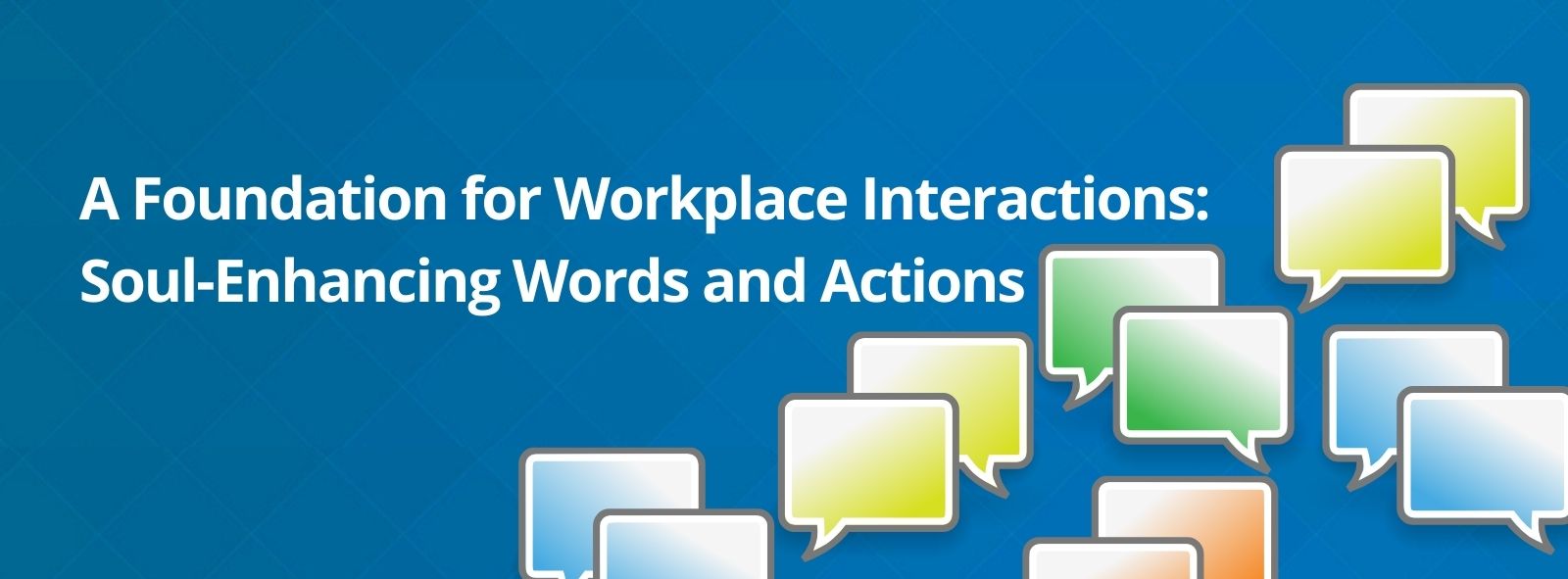We need a new way to think about workplace interactions
Ask any employee or manager what their workplace needs to improve, and the most likely answer will be “communication”. Next inline on the “must-improve” list will be “accountability” then, “dealing better with conflicts”. Fortunately, there is no lack of information to learn strategies for better communication, accountability and conflict management. To address root causes of poor communication, lack of accountability and increased conflict, the complexities of marginalization, gender, prejudice, racism and inequity are increasingly highlighted. Power differentials and workplace politics have been described.
The role of intergenerational trauma in workplace interactions is now starting to be understood. All these new learnings to help us understand human behaviour in the workplace are helpful. I use many of them to inform and deepen my own understandings, to question what might have previously seemed normal, and to think critically about what is currently touted as true. Yet there is something significant missing from the base of this discussion.
It is a basic understanding being reconsidered after hundreds – and even thousands – of years of common human experience. That understanding is an acknowledgement that humans at work are above all else spiritual beings. Certainly, we are experience life physically. The realities of our physical existence fill most of our waking and sleeping hours. But we are driven by purpose, meaning and a desire to know, connect and understand. We can be inspired to achieve great things even in the face of insurmountable difficulties. As human beings we can imagine something from nothing and make it into a physical reality. We can create, encourage, develop, build, and thrive.
This matters to workplace interactions because devoid of this spiritual acknowledgement of each other, there is nothing but an empty shell of repeated transactions to ensure survival, ultimately dehumanizing and deeply unsatisfying. Left to its own, this emptiness finds expression in aggression, vice, and damaging behaviours that undermine what we need to feel satisfied at work. If we wish to build workplaces where people regularly experience joy, feel productive and believe their work has purpose, then we need to build from a foundation of first seeing each other for who we are at our truest selves – our spiritual centre.
In my book, The Spirit of Work, I wrote:
The point is this: we create what we imagine. We build systems around the desired outcomes of our beliefs to prove the veracity of our beliefs. Share on X
One of my coaching clients could imagine the worries and difficulties of his company in detail, but when I asked him to visualize moving them to see what would be better, he couldn’t picture a new reality. He was struck by the realization that he focused so much on what was “wrong”, that he couldn’t see what good things he and his employees were accomplishing daily.
Another client had become so fixated on reporting safety violations that she couldn’t think of any instances where safety was being followed. It had become a game for employees to violate regulations and see how long it took before they were reprimanded.
Both these examples speak to what happens when we lose our sense that each of us has a soul and a purpose, that our work impacts others and that we are impacted by theirs, and that it is a sacred responsibility to imagine and build workplaces where this essential nature is central to our experience. What happened to both these individuals is that they had become so enmeshed in their own habits of fault finding and criticism that they could no longer see themselves, or the people they worked with for who they were.
So, let’s start imagining a future of work that goes further than technology and post-apocalyptic devastation. Instead let’s build workplaces we love, where we can imagine being with others in healthy, enjoyable interactions that build prosperity and solve conflicts more easily.
Sounds good, you might be thinking, but how?
I find it helpful to start with a self-awareness question:
Is this thought, comment or action I am doing or planning to do, soul-enhancing or soul-diminishing? Share on X
Soul-Enhancing
Soul-enhancing thoughts bring joy, happiness, insights, awareness, gratitude, appreciation, clarity. They promote love, unity, helpfulness, and are concerned with the health and well-being of all. Soul-enhancing comments and actions increase connectivity and build friendships. They are characterized by virtues and are based on building a legacy of being the kind of person others would feel safe with, and enjoy spending time with, whether or not they are similar or hold similar beliefs.
When we see ourselves and others as soul-like gems of multifaceted potential, communication becomes more intentionally good and inspires us to include others. When we act out of our best and truest selves, we attend to the development of our own character and enrich the character of those around us. Our very presence expands potential and invites others with a variety of beliefs and opinions into the circle of friends. We contribute to the development of potential – our own and others – and are careful about the impact of our words and deeds.
Soul-Diminishing
Soul-diminishing thoughts on the other hand, bring anger, judgement, entitlement, greed, and isolation. They promote dissention, prejudice, aggression, and hatred. They centre on concerns of “getting” from others, seeing people as objects to leverage or thwart personal gain and desire. The criticism and blame heaped on others in soul-diminishing words are also characteristic of how our inner voices speak inside ourselves.
When we see others in soul-diminishing ways, we dehumanize ourselves and others, shrinking human potential and promoting harm. We develop a legacy of vice and focus on the worst actions and behaviours around us and inside of us, acting without concern for consequences. Character is reduced to simplistic terms based only on small understandings of gender, race, creed or affiliation. Belonging is diminished to pushing against and excluding anyone who thinks differently than we do. Soul-diminishing behaviour constricts us into small, mean versions of ourselves that diminish others and close the circle of associations until it becomes self-destructive.
The actual framework for healthy and thriving workplace interactions has several facets, which I describe in detail in my book, but underneath every framework is a foundation. To imagine and build new workplace interactions requires intentionality practicing soul-enhancing expressions of our true selves, and in so doing dissolving the traps of soul-diminishing false identities. Imagine a workplace where everyone is concerned with the safety and wellbeing of others.
Then describe the types of behaviours required to sustain a culture that sees each person as infinitely important, cherished and valuable. This in essence, is the foundation for building soul-enhancing workplaces, out of which fruitful communication and appropriate conflict resolution will naturally emerge.
Call to action?
Ask yourself if what you are saying, doing or considering is soul-enhancing. Adjust your behaviours daily, being patient with yourself as you learn. As you experience the release of joy that soul-enhancing behaviour brings, each day will be better than the previous one, and your influence will inspire others to do the same.
About the Author
Marie Gervais, PhD, CEO, Shift Management specializes in helping employers train their supervisors to lead, get their workplace learning online and interactive, coach for performance, and conduct team assessments to figure out who to promote and how. She has a background in integrating and managing the diverse workforce and in creating culturally responsive curriculum courses and programs for industry. Marie’s book, “The Spirit of Work: Timeline Wisdom, Current Realities” to understand the deeper processes behind workplace issues and find inroads into creating healthy and vibrant organizations will be published in April 2022 by Friesen Press.











